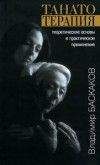Юджин Джендлин - Фокусирование. Новый психотерапевтический метод работы с переживаниями

Скачивание начинается... Если скачивание не началось автоматически, пожалуйста нажмите на эту ссылку.
Жалоба
Напишите нам, и мы в срочном порядке примем меры.
Описание книги "Фокусирование. Новый психотерапевтический метод работы с переживаниями"
Описание и краткое содержание "Фокусирование. Новый психотерапевтический метод работы с переживаниями" читать бесплатно онлайн.
Есть особый вид телесных ощущений, которым является наше чувство ситуации. Они смутны, неотчетливы, их трудно выразить словами. Но именно эти неясные ощущения служат своеобразным камертоном. Фокусируясь на этих ощущениях, шаг за шагом пытаясь прояснить их, можно вызывать реальные изменения в состоянии человека и качестве его жизни.
Юджин Джендлин, известный американский психотерапевт, психолог и философ предлагает метод работы с такими неотчетливыми ощущениями — фокусирование. В книге подробно рассматриваются его основные приемы, а также проводятся параллели с другими направлениями психотерапии.
Книга безусловно обогатит арсенал психотерапевтов и других специалистов “помогающих” профессий. Однако Джендлин время от времени переходит на прямой диалог с читателем — независимо от профессии — и предлагает вслед за ним и его клиентами чутко прислушаться к тому самому целостному “дыханию жизни”, которое бьется в каждом из нас.
Gendlin, E. T. (with Beebe, Cassens, Klein, and Oberlander). (1968c). Focusing Ability in Psychotherapy, Personality, and Creativity. In J. M. Shlien (Ed.), Research in Psychotherapy, Vol. 3. Washington, DC: American Psychological Association.
Gendlin, E. T. (1971). A Phenomenology of Emotions: In D. Carr and E. Casey (Eds.), Exploration in Phenomenology. The Hague, The Netherlands: Martinus Nijhoff.
Gendlin, E. T. (1972). Therapeutic Procedures with Schizophrenic Patients. In M. Hammer (Ed.), The Theory and Practice of Psychotherapy with Specific Disorders. Springfield, IL: Charles Thomas.
Gendlin E. T. (1973). Experiential Phenomenology. In M Natanson (Ed.), Phenomenology and the Social Sciences. Evanston, IL: Northwestern University Press.
Gendlin, E. T. (1975). The Newer Therapies. In S. Arieti (Ed.), American Handbook of Psychiatry, Vol. 5 (chap. 14). New York: Basic Book.
Gendlin, E. T. (1978/1979). Befindlichkeit. Review of Psychology and Psychiatry, 16 (1—3): 43—71.
Gendlin, E. T. (1981) Focusing, Second Edition. New York: Bantam Books. (Translation: Danish, Dutch, French, German, Hungarian, Japanese, Spanish, Swedish.)
Gendlin, E. T. (1982). Two Phenomenologists Do Not Disagree. In Bruzina and Wilshire (Eds.), Phenomenology: Dialogues and Bridges. Albany: State University of New York Press.
Gendlin, E. T. (1983). Dwelling. In R. C. Scharff (Ed.), Proceedings of the Heidegger Conference. University of New Hampshire. (Reprinted in H. Silverman, A. Mickunas, T. Kissel, and A. Lingis (Eds.), The Horizons of Continental Philosophy: Essays on Husserl, Heidegger and Merleau-Ponty. Dordrecht, The Netherlands: Kluwer, 1988.)
Gendlin, E. T. (1984). The Politics of Giving Therapy Away. In D. Larson (Ed.), Teaching Psychological Skills: Models For Giving Therapy Away. Monterey, CA: Brook/Cole.
Gendlin, E. T. (1984). The Client’s Client. In J. M. Shlien and R. Levant (Eds.), Client-Centered Therapy and the Person-Centered Approach. New York: Praeger.
Gendlin, E. T. (with Grindler, D., and McGuire, M.) (1984). Imagery, Body, and Space. In A. A. Sheikh (Ed.), Imagination and Healing. New York, Baywood.
Gendlin, E. T. (1986a). Let Your Body Interpret Your Dreams. Wilmette, IL: Chiron.
Gendlin, E. T. (1986b). Process Ethics and The Political Question. In A-T. Tymieniecka (Ed.), Analecta Husserliana, Vol. 20 (pp. 265—275). Boston; Reidel. (Reprinted in Focusing Folio, 5 (2): 68—87.)
Gendlin, E. T. (1986c). What Comes after Traditional Psychotherapy Research? American Psychologist, 41 (2); 131—136.
Gendlin, E. T. (1987). A Philosophical Critique of the Concept of Narcissism. In D. Levin (Ed.), Patologies of the Modern Self (pp. 251—304). New York: New York Universyty Press.
Gendlin, E. T. (1988). Obituary for Carl Rogers. American Psychologist, 43 (2).
Gendlin E. T. (1989). Toward a Bodily Human Nature. Discours Social/Social Discourse, 2 (1—2).
Gendlin, E. T. (1990). The Small Steps of the Therapy Process: How Trey Come and How to Help Them Come. In G. Lietar, J. Rombauts, and R. VanBalen (Eds.), Client-Centered and Experiential Psychotherapy in the Nineties. Leuven, Belgium. Leuven University Press.
Gendlin, E. T. (1991a). Crossing and Dipping: Some Terms for Approachihg the Interface between Natural Understanding and Logical Formation. In M. Galbraith and W. J. Rapaport (Eds.), Subjectivity and the Debate over Computational Cognitive Science (pp. 37—59). Buffalo State University of New York, Center for Cognitive Science.
Gendlin, E. T. (1991b). On Emotion in Therapy. In J. D. Safran and L. s. Greenberg (Eds.), Emotion, Psychotherapy, and Change (pp. 255—279). New York: Guilford. (Reprinted inThe Focusing Folio, 2 (1): 1—49. Also in Hakomi Forum, Winter 1992, Hakomi Institute, P. O Box 625, Branchville, NJ 07826.)
Gendlin, E. T. (1992a). The Primacy of the Body, Not the Primacy of Perception. Man and Wold, 25 (3—4): 341—353.
Gendlin, E. T. (1992b). Thinking beyond Patterns: Body, Language and Situations. In B. den Ouden and M. Moen (Eds.), The Presence of Feeling in Thought (pp. 25—151). New York: Peter Lang.
Gendlin, E. T. (1992c). The Wider Role of Bodily Sense in Thought and Language. In M. Sheets-Johnstone (Ed.), Giving the Body Its Due (pp. 192—207). Albany: State University of New York Press. (German translations in Deutsche Zeitschrift fur Philosophie, 41 (4), 1993, and Brennpunkt, 17, no. 63, 1995.)
Gendlin, E. T. (1996a). A Process Model. Unpublished manuscript. (In eight parts, 422 pages.)
Gendlin, E. T. (1996b). The Use of Focusing in Therapy. In J. K. Zeig (Ed.), The Evolution of Psychotherapy. New York: Brunner/Mazel.
Gendlin, E. T. (in press). Language After Post Modernism: Fourteen Commentaries on the Philosophy of Eugene Gendlin’s Replies. (D. Levin, Ed.). Evanston, IL: Northwestern University Press.
Gordon, T. (1970). Parent-Effectiveness Training. New York: P. H. Wyden.
Grindler, D. (1984). Focusing with a cancer Patient. In A. A. Sheikh (Ed.), Imagination and Healing. Amityville, NY: Baywood.
Grinder, D. (1995). Exploring Focusing and Bodily Meanings. Care Cassette, Vol. 22, 106. The College of Chaplains, 1701. E. Woodfield Rd., Schaumburg, IL 60173.
Grove, D. (1995). In the Presence of the Past. David Grove Seminars, RR5, Box 215 AA, Eldon, MO 65026.
Hart, J. T., and Tomlinson, T. M. (Eds.). (1970). New Directions in Client-Centered Therapy. Boston: Houghton Mifflin.
Hendricks M. N., and Cartwright, R. (1978). Experiencing in Dreems. Psychotherapy, Theory, Research, and Practice, 15 (3): 292—298.
Hendricks, M. N. (1984). A Focusing Group: Model for a New Kind of Group Process. Small Group Behavior, 15: 155—171.
Hendricks, M. N. (1986). Experiencing Level as a Therapeutic Variable. person-Centered Review, 1: 141—162.
Hendrix, H. (1988). Getting the Love You Want. New York: Holt.
Hinterkopf, E., and Brunswick, L. (1981). Teaching Mental Patients to Use Client-Centered and Experiential Therapeutic Skills with Each Other. Psychotherapy: Theory, Research, and Practice, 18: 394—402.
Iberg, J. R. (1981). Focusing. In R. J. Corsini (Ed.), Handbook of Innovative Psychotherapies. New York: Wiley.
Jaekins, H. (1962). Fundamentals of Co-Counseling. Seattle: Rational Island Press.
Juchli, E. (1995) GFK Texte, Vols. 1&2, Weierhofgasse 9, CH—9500 Wil, Switzerland.
Johanson, G., and Taylor, C. (1988). Hakomi Therapy with Emotionally Disturbed Adolescents. In C. Schaefer (Ed.), Innovative Interventions in Child and Adolescent Psychotherapy. New York: Wiley.
Jung, C. G. (1930/1976). Vision Seminars. Zurich: Spring Publications.
Jung, C. G. (1956). Two Essays on Analytical Psychology. New York: Meridian.
Katz, R. (1981). Focusing with the Critic. Focusing Folio, 1 (3).
Klein, M. N., Mathieu, P. L., Kiesler, D. J., and Gendlin, E. T. (1969). The Experiencing Scale: A Research and Training Manual. Bureau of Audio-Visual Instruction, the University of Wisconsin, Madison.
Kohut, H. (1977). The Restoration of the Self. New York: International Universities Press.
Lazarus, A. A. (1971). Behavior Therapy and Beyond. New York: McGraw-Hill.
Levin, D. M. (1985). The Body’s Recollection of Being. London: Routledge.
Liejssen, M. (1990). On Focusing and the Necessary Conditions of Therapeutic Personality Change. In G. Lietar, J. Rombauts, and VanBalen (Eds.), Client-Centered and Experiential Psychotherapy in the Nineties. Leuven, Belgium: Leuven University Press.
Lietar, G. (1988). Bibliographical Survey, 1950—1987. Katholieke Universiteit, Lleuven, Belgium.
Lietar, G., Rombauts, J., and VanBalen, R. (Eds.). (1990). Client-Centered and Experiential Psychotherapy in the Nineties. Leuven, Belgium: Leuven University Press.
McGuire, K. (1981). Building Supportive Community: Mutual Self-Help Through Peer Counseling, Training Manual. Focusing Northwest, 3440 Onyx Street, Eugene, OR 97405.
McGuire, K. (1991). Affect in Focusing and Experiential Psychotherapy. In J. D. Safran and L. S. Greenberg (Eds.), Emotion, Psychotherapy and Change (pp. 255—279). New York: Guilford.
McGuire, M. (1984). Making a Space. In A. A. Sheikh (Ed.), Imagination and Healing. Amityville, New York: Baywood.
McGuire, M. (1990). Caring Touch Training Manual. Focusing Institute Publications, 800—799—7418.
McMahon, E. M. (1993). Beyond the Myth of Dominance. Kansas City: Sheed &Ward.
Muller, D. (1995). Dealing with Self-Criticism: The Critic Within Us and the Criticized One. Focusing Folio, 14, (1).
Moustakas, C. (1996). Being-In, Being-For, Being-With. Psychotherapy Book News, 30.
Neagu, G. (1988). The Focusing Technique with Children and Adolescents. In C. Schaefer (Ed.), Innovative Interventions in Child and Adolescent Psychotherapy. New York: Wiley.
Olsen, L., and Gendlin, E. T. (1970). The Use of Imagery in Experiential Focusing. Psychotherapy: Theory, Research, and Practice, 7 (4).
Perl, S. (1994). A Writer’s Way of Knowing: Guidelines for Composing. In A Brand and R Graves (Eds.), A Writer’s Way of Knowing: Writing and the Domain Beyond the Cognitive. Portsmouth, NH: Boynton Cook.
Perl, F. (1969). Gestalt Therapy Verbatim. Lafayttte, CA: Real People Publishing.
Prouty, G. (1976). Pre-Therapy, A Method of Treating Psychotic and Retarded Patients. Psychotherapy: Theory, Research, and Practice, 13 (3).
Prouty, G. (1994). Theoretical Evolutions in Person-Centered/Experiential Therapy: Applications to Schizophrenic and Reterded Psychoses. Westport, CT: Praeger.
Rank, O. (1929/1945). Will Therapy and Truth and Reality. New York: Knopf.
Rogers, C. R. (1961). On Becoming A Person. Boston: Houghton Mifflin.
Rohlfs, A. (1990). Fraudulent Degrees or Fraudulent Assertions? Journal of Mental Health Counseling, 12 (1).
Safran, J. (1990). Interpersonal Process in Cognitive Therapy. New York: Basic Books.
Seeman, J. (1954). Counselor Judgments of Therapy Process and Outcome. In C. R. Rogers and R. Dymond (Eds.), Psychotherapy and Personality Change. Chicago: University of Chicago Press.
Seeman, J. (1983). Personality Integration. New York: Human Sciences Press.
Sherman, E. (1984). Working With Older Persons. Boston: Kluwer-Nijhoff.
Sherman, E. (1986). A Phenomenological Approach to Reminiscene and Life review. Clinical Gerontologist, 3: 3—16.
Shlien, J. M., and Levant, R. (Eds.), (1984). Client-Centered Therapy and the Person-centered Approach.New York: Praeger.
Skinner, B. F. (1953). Science and Human Behavior. New York: Macmillan.
Stern, Daniel N. (1985). The Interpersonal World of the Infant. New York: Basic Books.
Stern, Donnel (1983). Unformulated Experience. Contemporary Psychoanalysis, 19, (1).
Stern, Donnel. (in press). Unformulated Experience. Hillside, NJ: The Analytical Press.
Sullivan, H. S. (1940). The Interpersonal Theory of Psychiatry. New York: Norton.
Ullman, M., and Zimmerman, a. (1979). Working with Dreams. New York: Delacorte.
Weiser, A. (1994). The Focusing Student’s manual and The Focusing Guide’s manual. Focusing Resources, 2625 Alcatraz Ave. #202, Berkeley, CA 94705—2702.
Weiser, A. (in press). The Power of Focusing: A Practical Guide to Emotional Self-Healing. Oakland, CA: New Harbinger.
Welwood, J. (1996). Love and Awakening: The Sacred Path of Intimate Relationships. New York: Harper Collins.
Wexler, D. A., and Rice, L. N. (Eds.). (1974). Innovations Client-Centered Therapy. New York: Wiley.
Wiltsschkor, J. Focusing Biblothek, DAF, D—97082 Wurzburg, Frankfurter Strasse 10.
Wolfus, B., and Bierman, R. (1996). An Evaluation of a Group Psychotherapy Program for Incarcerated Male Batterers. Ontario Correctional Institute, 109 McLaughlin Rd. South, Brampton, Ontario L6V 2P1, Canada.
Zimring, F. M., and Balcombe, J. K. (1974). Cognitive Operations in Two Measures of Handling Emotionally Relevant Material. Psychotherapy: Theory, Research, and Practice, 11 (3).
Подписывайтесь на наши страницы в социальных сетях.
Будьте в курсе последних книжных новинок, комментируйте, обсуждайте. Мы ждём Вас!
Похожие книги на "Фокусирование. Новый психотерапевтический метод работы с переживаниями"
Книги похожие на "Фокусирование. Новый психотерапевтический метод работы с переживаниями" читать онлайн или скачать бесплатно полные версии.
Мы рекомендуем Вам зарегистрироваться либо войти на сайт под своим именем.
Отзывы о "Юджин Джендлин - Фокусирование. Новый психотерапевтический метод работы с переживаниями"
Отзывы читателей о книге "Фокусирование. Новый психотерапевтический метод работы с переживаниями", комментарии и мнения людей о произведении.























